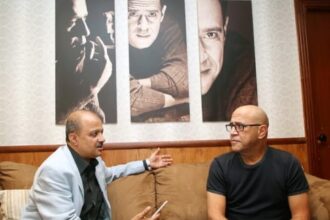When the Arab Shorts fest first opened in December 2009 at the Goethe Institute in Egypt, it filled a void, Goethe director Gunther Hasenkamp told Daily News Egypt at the opening of Arab Shorts 2011 on Thursday.
After much ado, Goethe had decided that in the absence of another venue, it was an imperative for it to host Arab shorts to bring together and present the works of independent filmmakers and curators from the Arab region, showing them via an online database.
Unlike previous festivals which carried the emphasis on putting films online, the focus appears to have also increased now to create an art festival, complete with “lunchtime talks” with festival organizers and a presentation by Alan Bieber of the culture network “arte CREATIVE.” Germany is also a guest program at the Arab shorts this year.
Independent filmmakers had had their moment at the first fest. Unencumbered by sponsors and censors, many had broken from filmmaking conventions to produce short films screened to a local and online audience. The program that opened the fest this year, in contrast, featured films where a revolution was reflected in the content rather than in style.
At the largely attended, cramped venue, the selection “Personal Freedom: Fiction within the truth” featured films curated by Hala Galal and Ayman Hussein that tackled the question of whether freedom existed, or was merely a fiction.
Some interesting ironies present themselves, sometimes all too pedagogically, in the narratives featured on the first night. “Karim,” a documentary film and one of the more interesting selections, owes its appeal largely to the choice of its camera-friendly lead character.
“There’s only one Karim Alagouz,” he says, keenly posing with his cigarette, his t-shirt, and his views. “I wouldn’t go to the revolution to become a martyr. I would have been a thief,” he offers with shocking candor, “That’s what the streets taught me.” At nighttime, Karim and his friend eat their first meal of the day outside McDonalds.
Indulgent doses of censure and irony are also offered in Noha Al-Maadawy’s “Four Seasons,” which begins with an old man listening to Mubarak deliver “a speech that comes from the heart to all my sons and daughters.”
Tying together disparate memories of having stage fright before Suzanne Mubarak, walking through the rain-drenched streets during the revolution, the narrator in Maadawy’s short asks a question for which the audience too begs an answer: “What will we do with all these memories?”
In “Suspended Freedom,” the subject is a house-help who goes about her daily duties, while recounting instances of violence during the revolution. While it is her husband that is in jail, she says it is as if “I was imprisoned for seven years, not him.”
Life for the cleaner-woman, who underwent treatment for breast cancer, did not ease up. “There is no rest in my world. I don’t know why. I fear tomorrow. I hate tomorrow.”
“Our Weapon” too is topical, rather than stylistic, offering graffiti as a weapon of free expression against the guns, “their weapon.” The film follows discussions around, preparation of, and the execution of graffiti.
Like Karim of the aforementioned short, the narrator offers a quotable line: “What bothers me is when people say we’re making the walls dirty; as if they were clean before.”
Of all the films screened, the fiction piece “Payback” epitomizes “poverty porn,” deriving its value by indulging in the extreme suffering of the underprivileged. The content, again, offers nothing that is new, surprising, or cathartic.
Overall, the films in the first round of the five-day festival proved to be a disappointing start. This first year began with names and films that were already known to those in the know, Hasemkamp said. In that sense, it was a “safe” opening.
This year, the festival provided a more open platform; with conditions were more relaxed regards topics of films, and the regions. Unlike previous years where films were restricted to one nation per curator in 2009, or the Arab regions in 2010, films this year were included in the fest if they were made by an Arab director or concerned an Arab topic.
Maha Maamoun, who co-curated “A State of Fluidity” with Sarah Rifky, said their selection included a film, “Tarahi II” by Cypriot director Haris Epaminonda. Tarahi, meaning “turmoil,” film concerns images of an Egyptian actress that the narrator sees on a television and the resulting mood.
Maamoun, also a visual artist, said their selection included films that were tied together by a specific mood rather than a solid theme. Unlike the content-heavy selection of the first night, upcoming nights assure a varied selection of films, some of which promise to weigh in on style.
For more information and the calendar of upcoming events at the fest, please visit http://www.arabshorts.net/

“Tarahi,” meaning turmoil, concerns images of an Egyptian actress that the narrator sees on a television and the resulting mood.

